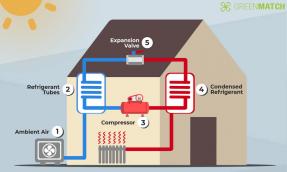Considering the Environmental Effects of Solar Panels


Have you ever thought of how much pollution a single household produces in a life time? Or even in a year? Here are some figures to help us think through this important question:
Approximately 7.5 tons of carbon dioxide is produced in a house each year. And the average annual electricity consumption for a U.S. residential utility customer was 10,649 kilowatts hours (kWh), an average of about 877 kWh per month in 2019.
Now, multiply these numbers to a city, the state, then a country, and then on a global scale. That calculation can represent a gigantic amount of waste. What can we do about it?
Well, a few things. First, be aware about this situation. And then, try to do something that can help preserve the environment. If every household does even a little, the results will be grand at the end.
Many people want to protect the planet, which also means more of us want to use renewable sources of energy like solar power.
Solar panels can contribute in many ways to lowering our impact on the environment and on human health:
- Solar energy is a clean source of energy: it reduces emission and pollution (97% less acid rain than coal and oil).
- Solar panels reduce carbon emission and fossil fuel reliance, which consequently reduces illnesses related to pollution.
- Also, solar panels can be recycled after they are no longer in use. This emerging technology is already in use in certain places, and is coming soon in others.
In addition, it’s important to remember that solar panels are a great investment. The average cost varies by the brand, the size, and the state. However, the payback of about eight years is approximately the same for everyone. It varies only on the panel efficiency and the building consumption.
Researchers at the Lawrence Berkeley Lab conducted a study from 2007 to 2015. They concluded that within those eight years, solar energy had produced $2.5 billion in climate savings, another $2.5 billion in air pollution savings.
Although there is a growing interest in installing solar panels (according to SEIA, Solar Energy Industry Association, in 2019 the US achieved 2 million solar PV installations), people are still hesitant to take that step due to several concerns or myths. Some of the concerns include: Does the production of solar panels cause pollution? How do you recycle solar panels? Or even, are the panels environmentally friendly after all?
There is a common myth that solar manufacturing results in more pollution than is saved by solar usage. However, the National Renewable Energy Laboratory of the United States Department of Energy attest that Photovoltaic (PV) systems (power system designed to supply usable solar power by means of photovoltaics) reduce carbon dioxide and other pollution through their clean energy production.
According to NREL “An average U.S. household uses 830 kilowatt-hours of electricity per month. On average, producing 1000 kWh of electricity with solar power reduces emissions by nearly 8 pounds of sulfur dioxide, 5 pounds of nitrogen oxides, and more than 1,400 pounds of carbon dioxide. During its projected 28 years of clean energy production, a rooftop system... meeting half of a household’s electricity use would avoid conventional electrical plant emissions of more than half a ton of sulfur dioxide, one-third a ton of nitrogen oxides, and 100 tons of carbon dioxide.”
The study concludes, “PV is a wise energy investment with great environmental benefits!”

Recycling solar panels.
The recycling of solar panels is a promising concept that is currently in development. Although many companies have sold numbers of panels in the past, there is still no substantial information on the disposal at the end of their lifespan. We are currently at the moment when the first solar panels are close to achieve the end of their working capacity, and only a few companies in the US (compared to Europe) are developing recycling methods.
Fortunately, companies like Recycle PV, SEIA, and Cleanlites already provide recycling services in the US, and will certainly see the demand for their services grow over the next several years.
Companies like SunPower and First Solar allow the customers to return their old solar panels to be recycled or repurposed. This is one example that shows the promise of global recycling programs.

Does the Solar System Need Additional Batteries?
Some people have questions whether they should install batteries along with the solar system or not. To clarify, batteries are an option to store electricity excess, to be used in periods when energy is not being produced or when more energy is consumed than is being produced. Batteries are essential for smoothing out what can be varying renewable energy production levels and serve as backup power sources during blackouts. In case if you do not have the batteries, your house is connected to the conventional electricity grid; so, during the night time or on overcast days, you still have power. In a system called “net metering, ” energy produced in excess of need that is returned to the grid generates a credit or even a payment in some cases, if the energy generated is more than what was consumed.
Battery units take last for approximately 5 to 15 years. Therefore, if the battery is installed together with the solar panels, they will need a replacement to match the 20- to 30-year lifespan of the solar power system. Some battery manufacturers provide a lifetime warranty.
It’s also important to consider how good batteries are for the environment. In general, batteries can be recycled at a designated recycling facility. The idea is to give the battery to a licensed professional or to return it to the manufacturer. There is also an option to recharge the batteries once they start working at a lower capacity level. Just make sure to ask your solar battery installer or provider about the different types of batteries and about their recycling and recharging options.
It seems that there is a steady growth of environmentally minded people in the world in the recent years. More and more, people are choosing products and services based on the factors of how they affect the environment. Solar panels, in this regard, is a great choice. They are not only helping to reduce the pollution, but they are saving money as well.
As more and more solar panels appear on rooftops and elsewhere, this creates inspiration for others as well as a positive awareness on how we are working to reduce the impacts on Earth. If you also feel inspired, you can also read this piece to learn more about smart choices for your building: Solar Panels - Making Efficient Choices for Your Building.
Further reading
https://www.greenmatch.co.uk/blog/2014/12/how-are-solar-panels-made
https://www.greenmatch.co.uk/blog/2018/07/solar-battery-storage-system-cost
https://www.greenmatch.co.uk/solar-energy/photovoltaics/photovoltaic-system
https://solarcraft.com/solar-energy-myths-facts/
https://sinovoltaics.com/learning-center/storage/solar-battery-disposal-solar-battery-recycling/
https://www.solarpowerworldonline.com/2019/10/a-qa-on-battery-recycling/
https://solarmetric.com/learn/positive-impact-of-solar-energy-environment/
Images:
https://corporatefinanceinstitute.com/resources/knowledge/trading-investing/solar-energy-etfs/
https://forwardflorida.com/real-estate/floridas-babcock-ranch-first-solar-powered-city-u-s/
https://www.energymatters.com.au/renewable-news/solar-battery-recycling-save-environment/
- Filed Under: Solar Energy
- Keywords : Climate Change, Renewable Energy, Solar Panels
- ( 16949 ) views

I am an Architect and Urban Planner graduated in Brazil and working with architecture since 2013. Nowadays I am living in Boston area. I have Zero Energy Building course completed in Harvard Extension School and this year could get my LEED GA credential. My interest in Sustainability and Green Buildings is growing up every day and becoming my focus, therefore my aspiration is to gain more experience and help people with my expertise.
- ( 0 ) Ratings
- ( 5 ) Discussions
- ( 5 ) Group Posts
Reply/Leave a Comment (You must be logged in to leave a comment)
Dear Suelen,
I really enjoy your posts, thank you for sharing this valuable information.
I'm the Sustainability Director of an automation and engineering company for the building sector, and a doctoral student in sustainable engineering.
In this sense and based on this post, I have serious concerns about the overall sustainability of solar panels, specifically, regarding its raw materials extraction (minerals that might come from countries in conflict) and its fabrication.
Do you know any brand you can recommend that has sustainability certifications and/or code of ethics applicable for their solar panels production?
Thank you and regards from Venezuela.
Jose Solano
https://www.linkedin.com/in/jasolanop
Connect with us!
Subscribe to our monthly newsletter:
 Greenbuild Report Out, 2025 Nov 12, 2025
Greenbuild Report Out, 2025 Nov 12, 2025






























Not a Member Yet? Register and Join the Community | Log in